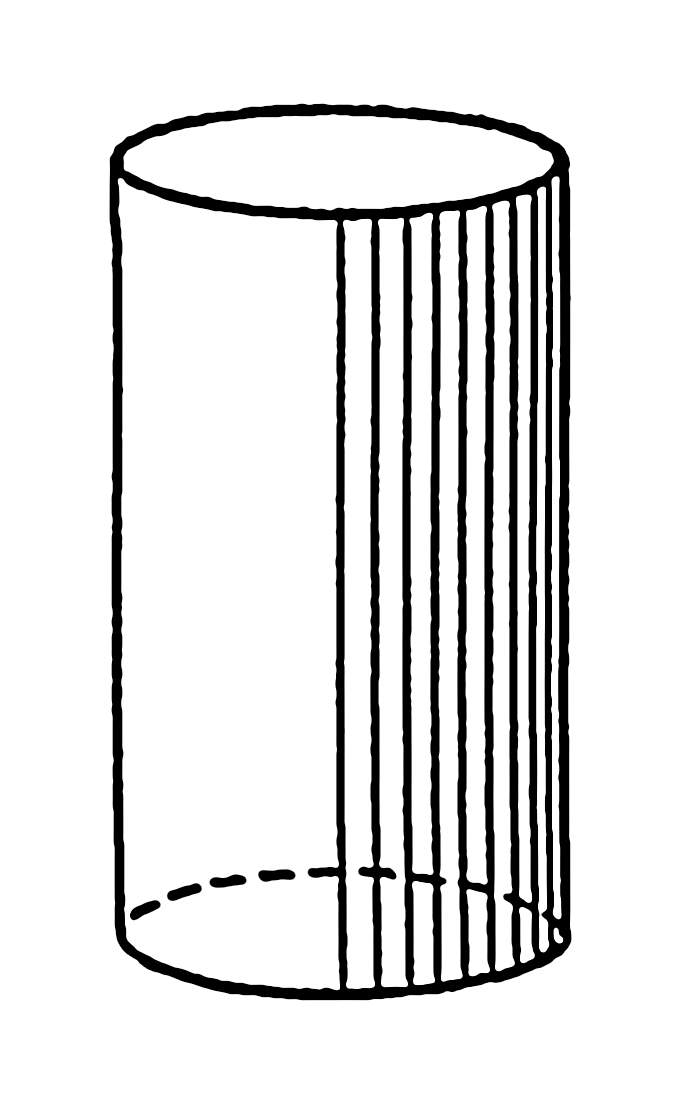How to find the surface area of a cylinder
Help Questions
Math › How to find the surface area of a cylinder
Find the surface area of the given cylinder.

Explanation
To find the surface area of the cylinder, first find the areas of the bases:
Next, find the lateral surface area, which is a rectangle:
Add the two together to get the equation to find the surface area of a cylinder:
Plug in the given height and radius to find the surface area.
Make sure to round to 
What is the surface area of a cylinder of height 






Explanation
Recall that to find the surface area of a cylinder, you need to find the surface area of its two bases and then the surface area of its "outer face." The first two are very easy since they are circles. The equation for one base is:
For our problem, this is:
You need to double this for the two bases:
The area of the "outer face" is a little bit trickier, but it is not impossible. It is actually a rectangle that has the height of the cylinder and a width equal to the circumference of the base; therefore, it is:
For our problem, this is:
Therefore, the total surface area is:
Given a cylinder with radius of 5cm and a height of 10cm, what is the surface area of the entire cylinder?
Explanation
The surface area of the whole cylinder = (2 * area of circle) + lateral area
Think of the lateral area as the paper label on a can; It wraps around the outside of the can while leaving the top and bottom untouched. The area of the circle, times 2, is to account for the top and the bottom of the cylinder.
Area of a circle =
So the area of the circle = 
Now for the lateral area. Notice how if we have a can with a paper label, we can take the label, cut it, and unroll it from the can. In this way, our label now looks like a rectangle with a
height = height and the
width = circumference of the circle.
Circumference =
So our rectangle is going to have a height of 10 and a width of 10
So the total surface area =
Find the surface area of the following cylinder.

Explanation
The formula for the surface area of a cylinder is:
where 

Plugging in our values, we get:
The base of a cylinder has an area of 

Explanation
The standard equation for the surface area of a cylinder is
where 

We know the area is

Now that we have both 

What is the surface area of cylinder with a radius of 3 and height of 7?
Explanation
The surface area of a cylinder can be determined by the following equation:
Find the surface area of the following partial cylinder.

Explanation
The formula for the surface area of this partial cylinder is:
where 


Plugging in our values, we get:
Find the surface area of the following partial cylinder.

Explanation
The formula for the surface area of this partial cylinder is:
Where 


Plugging in our values, we get:
This figure is a right cylinder with radius of 2 m and a height of 10 m.
What is the surface area of the right cylinder (m2)?
Explanation
In order to find the surface area of a right cylinder you must find the area of both bases (the circles on either end) and add them to the lateral surface area. The area of the two circles is easy to find with 

Next find the lateral area. The lateral area if unrounded would be a rectangle with height of 10 m and length equal to the circumference of the base circles. Thus the lateral area is
Now add the lateral area to the area of the two bases:
Find the surface area of a cylinder given that its radius is 2 and its height is 3.2.
Explanation
The standard equation to find the surface area of a cylinder is
where 

Plug in the given values for 

























































































